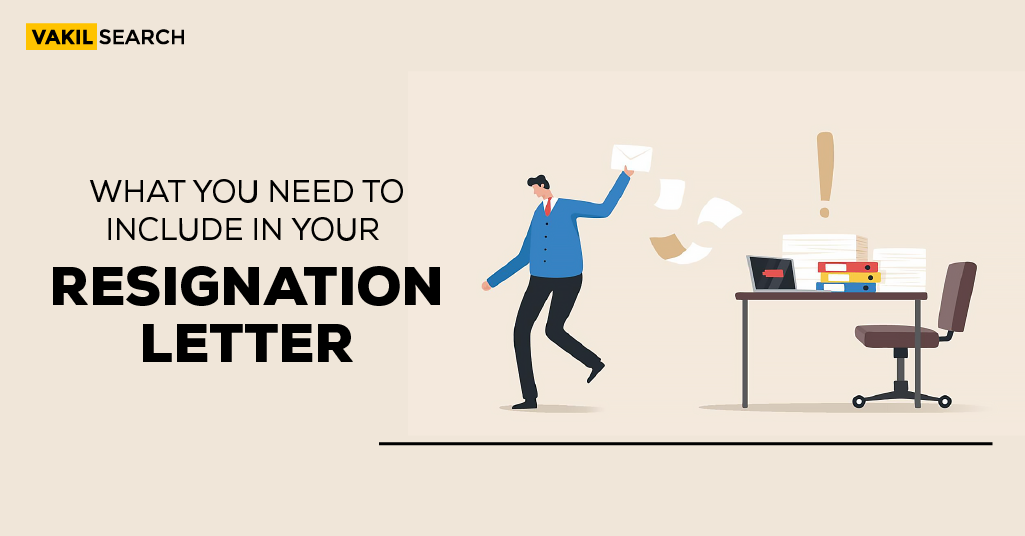Uncover the key elements of a successful resignation letter. Navigate the process with clarity, gratitude, and professionalism for a smooth transition and positive connections.
Introduction
Leaving a job is a significant step in anyone’s career journey, and it’s essential to part ways on a positive note. One crucial element of this process is the resignation letter. Know more on What You Need to Include in Your Resignation Letter?
This document serves as a formal announcement of your decision to leave the company and provides an opportunity to express gratitude, professionalism, and goodwill. In this comprehensive guide, we’ll explore the key components you need to include in your resignation letter to ensure a smooth transition and maintain positive relationships.
Clear Statement of Resignation
Begin your resignation letter with a clear and concise statement of your intention to resign. Avoid ambiguity and get straight to the point. State your last working day in the company to provide clarity on the timeline for your departure. For example:
|
*’Dear [Supervisor’s Name], I am writing to formally resign from my position as [Your Position] at [Company Name], effective [Last Working Day, usually two weeks from the date of the letter].* |
Express Gratitude
Expressing gratitude is a crucial element in any resignation letter. Acknowledge the opportunities and experiences you gained during your tenure with the company. This not only reflects positively on your character but also helps maintain a positive relationship with your soon-to-be former employer and colleagues. Here’s an example:
| ‘I want to express my sincere gratitude for the opportunities for professional and personal development that you and the company have provided me during my time here.’ |
Reason for Resignation (Optional)
While it’s not mandatory to include the reason for your resignation, providing a brief and diplomatic explanation can be helpful. If your departure is due to a career change, relocation, or other personal reasons, briefly mention it without going into excessive detail. If your reason is negative, focus on the positive aspects of your decision. For instance:
| ‘After careful consideration, I have decided to pursue a new opportunity that aligns with my long-term career goals. I believe this change will contribute to my professional growth and allow me to bring new skills and perspectives to my future endeavors.’ |
Offer to Assist in Transition
Demonstrate your commitment to a smooth transition by offering assistance during the handover period. This may include training a replacement, documenting ongoing projects, or providing guidance to your colleagues. This proactive approach showcases your professionalism and dedication to leaving the company in good standing. An example statement could be:
| ‘I am committed to ensuring a smooth transition during my remaining time here. I am more than willing to assist in training a replacement, documenting ongoing projects, and providing any necessary guidance to facilitate a seamless handover.’ |
Positive Closing
End your resignation letter on a positive note. Reiterate your appreciation, express optimism for the company’s future, and convey your best wishes to your colleagues and superiors. Maintaining a positive tone contributes to leaving a lasting impression. Here’s an example:
|
*’I am truly grateful for the experiences and relationships I have developed during my time at [Company Name]. I wish the company continued success, and I hope our paths may cross again in the future. Thank you for the support and camaraderie. Best regards, [Your Full Name]’* |
Professional Formatting and Tone
Ensure that your resignation letter maintains a professional tone and follows proper formatting. Use a clear and legible font, standard business letter format, and proofread your letter for any grammatical errors or typos. A well-structured and error-free document reflects positively on your professionalism.
Conclusion:
Crafting a resignation letter is an integral part of the professional departure process. By including these key elements, you not only fulfill the formal requirements but also leave a positive lasting impression.
A thoughtful and well-constructed resignation letter contributes to maintaining positive relationships, securing references for future opportunities, and leaving the door open for potential collaborations down the line. Remember, a graceful exit is just as important as a strong entrance in the world of professional growth.
FAQs
What is the primary purpose of a resignation letter?
A resignation letter serves as a formal notification of your decision to leave a job. It's a professional document that communicates your departure date, expresses gratitude, and helps maintain a positive relationship with your employer.
Is it necessary to include the reason for resigning in the letter?
While not mandatory, providing a brief and positive reason for resigning can add context. It fosters transparency and demonstrates professionalism. However, it's crucial to maintain a diplomatic tone, focusing on the positive aspects of your decision.
How should I express gratitude in my resignation letter?
Acknowledge the opportunities and experiences you gained during your tenure. A simple statement expressing sincere gratitude for professional and personal development demonstrates appreciation and contributes to leaving on a positive note.
Should I offer assistance in the transition process?
Yes, offering assistance showcases professionalism and commitment. Mention your willingness to aid in training a replacement, documenting ongoing projects, or providing guidance. This proactive approach helps ensure a seamless transition and leaves a positive impression.
How can I maintain a positive tone in my resignation letter's closing?
End on a positive note by reiterating your appreciation for experiences and relationships. Express optimism for the company's future, convey best wishes, and thank your colleagues and superiors. Maintaining a positive tone contributes to leaving a lasting and favorable impression.





